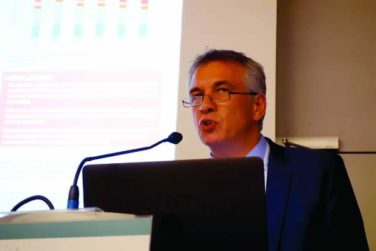FROM ANNALS OF THE AMERICAN THORACIC SOCIETY
Nearly three-quarters of lung transplant recipients are likely to gain at least 2 years of survival, according to new research.
In a study published in the February issue of the Annals of the American Thoracic Society, researchers used data from 13,040 adults listed for lung transplantation between May 2005 and September 2011 to develop a structural nested accelerated failure time model of the survival benefit of lung transplantation over time.
“A ‘structural nested model’ is [used to] compare the distribution of counterfactual residual survival if a patient were to receive a transplanted organ with the survival distribution if the patient did not receive that organ and never received one subsequently,” wrote David M. Vock, PhD, from the University of Minnesota, and coauthors.
Using this approach, they calculated that 73.8% of transplant recipients were predicted to achieve a 2-year survival benefit with transplantation. At 1 year posttransplantation, the relative survival benefit was 1.59, at 2 years it was 1.93, and at 3 years it was 2.23 (Ann Am Thorac Soc. 2017;14:172-81. doi: 10.1513/AnnalsATS.201606-507OC ).
Patients’ lung allocation score at transplantation (LAS-T) – the score used to prioritize donated lungs for transplantation – had a significant impact on the survival benefit from transplantation. The relative survival benefit of transplantation increased by 59.4% as the lung allocation score increased from 30 to 35, and increased by 45.1% as the lung allocation score increased from 50 to 55.
However patients with a lung allocation score of 32.5 or less were more likely to die with a transplant than without, even over the long term, while patients with a score of 35 or more always gained a survival advantage from transplantation, even if their scores were as high as 50-100. The authors said this showed there should be no upper limit for the lung allocation score.
“It has been suggested that the LAS system may encourage patients who have clinically deteriorated to undergo transplantation even though it would be futile,” they wrote. “Our results reinforce the notion that lung transplantation should be considered an appropriate treatment option for patients with most advanced lung diseases and is expected to confer survival benefit in appropriately selected patients.”
Researchers also observed an interesting, borderline significant association between disease group and survival benefit, with individuals with obstructive lung disease showing the lowest relative survival gains and those with cystic fibrosis showing the highest. Head to head, the relative survival benefit of transplantation for those with cystic fibrosis was 54.4% greater than for those with obstructive lung disease.
Other factors such as transplant type, age, smoking, and center volume also influenced relative survival benefit. Bilateral transplants were associated with a 13.4% greater relative survival benefit, lungs from donors aged under 55 years showed a 17.9% relative survival benefit, and lungs from donors without a history of smoking showed a 10.5% increase in relative survival benefit.
However the researchers noted that their modeling focused on only the survival benefit of transplantation and did not take into account improvements in quality of life. This was likely to be particularly relevant in conditions such as chronic obstructive pulmonary disease where the quality of life benefits might justify transplantation even in the absence of a clear survival benefit.
“A comprehensive understanding of the survival benefit of lung transplantation and how that benefit varies by recipient characteristics is imperative to inform recipient selection, to justify the intensive health care resources allocated to this treatment, and to achieve an equitable allocation of donor lungs,” the researchers said.
The study was supported by the National Heart, Lung, and Blood Institute; the National Cancer Institute; and the National Institute of Allergy and Infectious Diseases. One author declared grants and personal fees from private industry for consultation on lung transplantation. No other conflicts of interest were declared.





